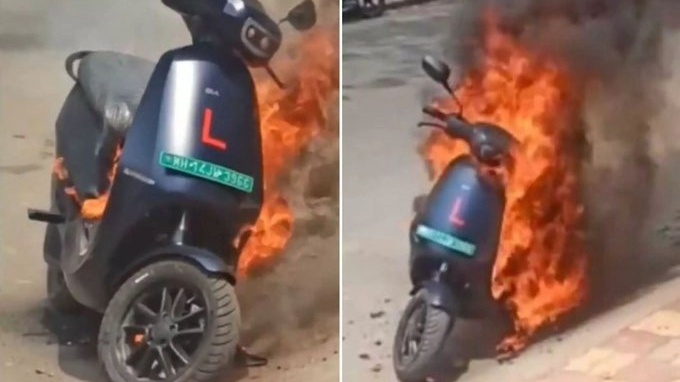3 manufacturers recall their vehicles: How will it impact the EV market?
Ola, Okinawa & Pure at it

After Pure EV and Okinawa Autotech, Ola Electric has become the latest electric two-wheeler maker in the country to recall some of its scooters in the wake of allegations of malfunctioning, and fire incidents involving the battery pack.
In fact, the electric vehicle industry, especially two-wheelers segment, has been in a tizzy in the last month or so as there has been a boom, if that is the word, in the number of explosions of batteries in EVs.
After dead-batting most of the allegations of faulty battery packs, Okinawa Autotech set the ball rolling by recalling over 3215 units of its Praise Pro EV, while PureEV did a similar exercise for around 2,000 units of its Etrance+ and Epluto 7G of the concerned batches.
Now, Ola Electric has announced that it is voluntarily recalling 1,441 e-scooters as a pre-emptive measure to conduct a 'detailed health check' of the concerned batch. The company said that its internal investigation into the March 26 incident when an Ola S1 Pro e-scooter caught fire in Pune has revealed that the thermal incident was an isolated one.
"As a pre-emptive measure, we will be conducting a detailed diagnostics and health check of the scooters in that specific batch and, therefore, issuing a voluntary recall of 1,441 vehicles," Ola Electric said in a statement.
In all, more than 6,000 vehicles have been recalled between Ola, Okinawa, and Pure. Another firm, Jitendra New EV Tech, is also looking into fire incidents.
Govt reads the riot act
We have constituted an Expert Committee to enquire into these incidents and make recommendations on remedial steps.Based on the reports, we will issue necessary orders on the defaulting companies. We will soon issue quality-centric guidelines for Electric Vehicles.April 21, 2022
The recalling of vehicles have been voluntary, but they sure have been nudged in that direction by the government which did not mince any words in warning the negligent EV companies.
Get daily insight, inspiration and deals in your inbox
Sign up for breaking news, reviews, opinion, top tech deals, and more.
Last week, Union Transport Minister Nitin Gadkari, in a series of tweets, said that an expert committee would investigate the accidents and that high penalties, among other measures, will be imposed.
"Several accidents employing electric two-wheelers have been reported in the previous two months. It is tragic that some individuals have died and others have been hurt as a result of these tragedies. We have formed an Expert Committee to investigate these instances and offer suggestions on corrective actions," he said.
"We will issue the required orders on the defaulting corporations based on the reports. We will be issuing quality-focused recommendations for electric vehicles very shortly," he further said. Adding further, Gadkari said, "If any corporation is found to be careless in their practises, a severe penalty would be applied, and all defective cars will be recalled."
EVs recall: Some positives
EVs constitute a mere 1% of the total vehicles sales in India, but their share is rising. India aims to account for 80% of total two-wheeler sales by 2030. The government is providing significant incentives to encourage the production of electric vehicles in the country.
The battery-blaze phenomenon, however, has emerged as a major threat to the industry. Dealers have been terminating contracts and customers cancelling bookings and seeking refunds. These are verily incidents that the nascent segment could have done without.
But as the unfortunate events --- surely due to the negligence and irresponsibility of the companies concerned --- have occurred, nothing can be undone now.
To be sure, by a conservative estimate, these blaze and the attendant bad publicity have put the industry back by at least a year. But on the positive side, it has given the companies a chance to iron out their chinks.
Also, as coincidence would have it, since these incidents involving different companies have happened around the same time, the impact and media focus have been enormous, and the companies could not escape, as they may have done otherwise.
The recall of vehicles as a phenomenon is not regular in Indian automobile context. Companies have gotten away with worse. But already three companies have recalled some of their vehicles, and that is unprecedented in Indian consumer history. Purely in that sense, it is good.
It will also help drive home the point that companies cannot brazen it out anymore. They need to do more testing and get clearance before putting out their vehicles in the market. Also, such incidents help to differentiate the grain from the chaff, as it were.

Over three decades as a journalist covering current affairs, politics, sports and now technology. Former Editor of News Today, writer of humour columns across publications and a hardcore cricket and cinema enthusiast. He writes about technology trends and suggest movies and shows to watch on OTT platforms.